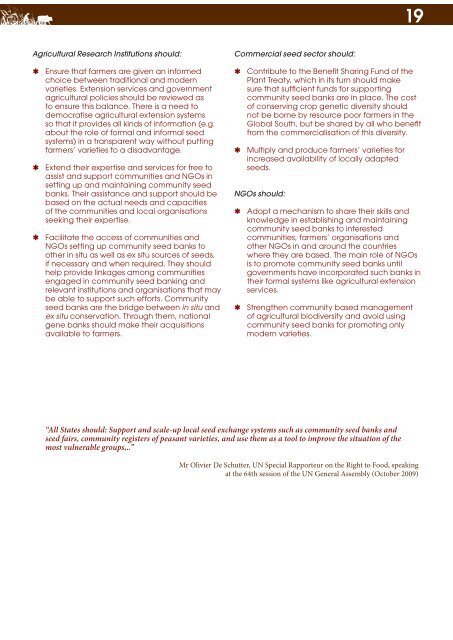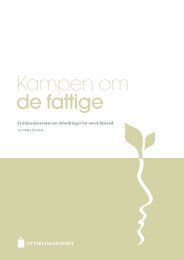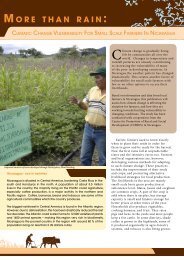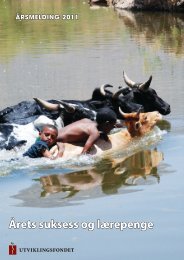Banking for the future: - Third World Network
Banking for the future: - Third World Network
Banking for the future: - Third World Network
- No tags were found...
You also want an ePaper? Increase the reach of your titles
YUMPU automatically turns print PDFs into web optimized ePapers that Google loves.
19Agricultural Research Institutions should:Commercial seed sector should:ÁÁÁÁÁÁEnsure that farmers are given an in<strong>for</strong>medchoice between traditional and modernvarieties. Extension services and governmentagricultural policies should be reviewed asto ensure this balance. There is a need todemocratise agricultural extension systemsso that it provides all kinds of in<strong>for</strong>mation (e.g.about <strong>the</strong> role of <strong>for</strong>mal and in<strong>for</strong>mal seedsystems) in a transparent way without puttingfarmers’ varieties to a disadvantage.Extend <strong>the</strong>ir expertise and services <strong>for</strong> free toassist and support communities and NGOs insetting up and maintaining community seedbanks. Their assistance and support should bebased on <strong>the</strong> actual needs and capacitiesof <strong>the</strong> communities and local organisationsseeking <strong>the</strong>ir expertise.Facilitate <strong>the</strong> access of communities andNGOs setting up community seed banks too<strong>the</strong>r in situ as well as ex situ sources of seeds,if necessary and when required. They shouldhelp provide linkages among communitiesengaged in community seed banking andrelevant institutions and organisations that maybe able to support such ef<strong>for</strong>ts. Communityseed banks are <strong>the</strong> bridge between in situ andex situ conservation. Through <strong>the</strong>m, nationalgene banks should make <strong>the</strong>ir acquisitionsavailable to farmers.ÁÁÁÁContribute to <strong>the</strong> Benefit Sharing Fund of <strong>the</strong>Plant Treaty, which in its turn should makesure that sufficient funds <strong>for</strong> supportingcommunity seed banks are in place. The costof conserving crop genetic diversity shouldnot be borne by resource poor farmers in <strong>the</strong>Global South, but be shared by all who benefitfrom <strong>the</strong> commercialisation of this diversity.Multiply and produce farmers’ varieties <strong>for</strong>increased availability of locally adaptedseeds.NGOs should:ÁÁÁÁAdopt a mechanism to share <strong>the</strong>ir skills andknowledge in establishing and maintainingcommunity seed banks to interestedcommunities, farmers’ organisations ando<strong>the</strong>r NGOs in and around <strong>the</strong> countrieswhere <strong>the</strong>y are based. The main role of NGOsis to promote community seed banks untilgovernments have incorporated such banks in<strong>the</strong>ir <strong>for</strong>mal systems like agricultural extensionservices.Streng<strong>the</strong>n community based managementof agricultural biodiversity and avoid usingcommunity seed banks <strong>for</strong> promoting onlymodern varieties.“All States should: Support and scale-up local seed exchange systems such as community seed banks andseed fairs, community registers of peasant varieties, and use <strong>the</strong>m as a tool to improve <strong>the</strong> situation of <strong>the</strong>most vulnerable groups,..”Mr Olivier De Schutter, UN Special Rapporteur on <strong>the</strong> Right to Food, speakingat <strong>the</strong> 64th session of <strong>the</strong> UN General Assembly (October 2009)








